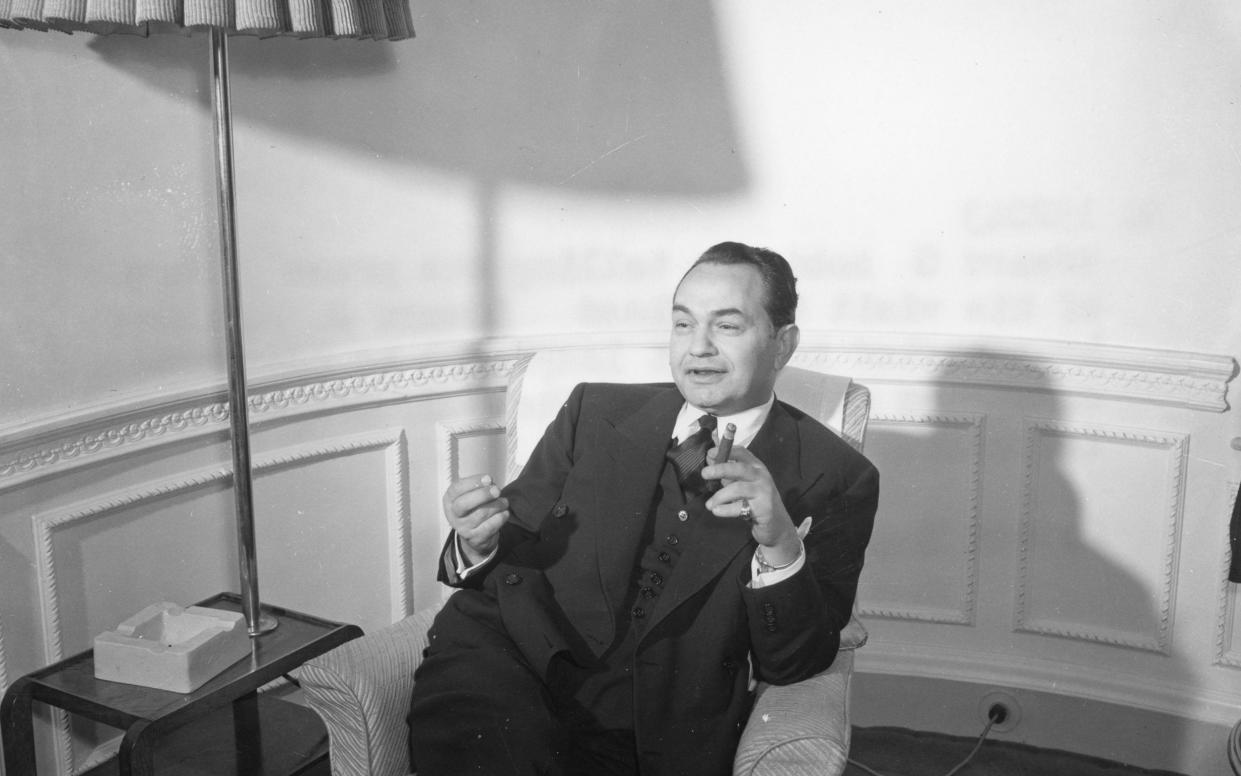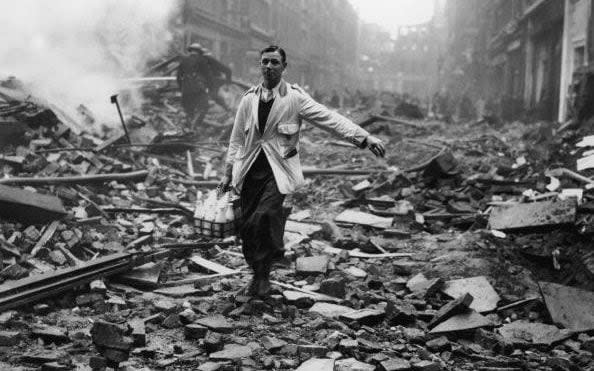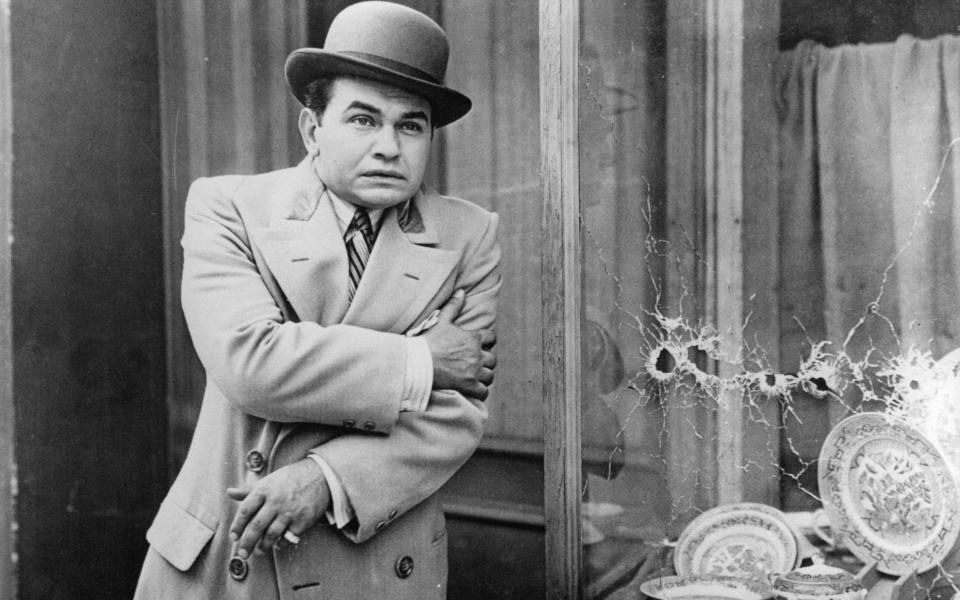Edward G Robinson, the Hollywood tough guy who fought Hitler’s ‘gangsterism’ – from Britain

Two years after Winston Churchill’s “We shall fight them on the beaches” speech, another short and charismatic figure, seldom photographed without a cigar, lifted listeners’ spirits with a series of rousing speeches up and down Britain – and over its airwaves.
Genial American movie star Edward G Robinson – known the world over as one of Hollywood’s most popular screen gangsters – crossed the Atlantic on a Clipper plane in late October 1942, 50 years ago this month. The Romanian-born Jewish actor, whose real name was Emanuel Goldenberg and who had first shot to fame thanks to his performance as the eponymous hoodlum Little Caesar a decade earlier, was on a mission to broadcast across Europe from London and to entertain the American forces based in Britain.
At the age of 48, he was too old to fight, so he had gone to Washington to ask that the American government make use of him – and the Office of War Information (OWI) promptly dispatched him over here.
One of his first ports of call from his base at London’s Savoy Hotel was Teddington Studios where he paid a surprise visit to an old friend from Warner Bros, Max Milder, an American movie producer. Milder was working on The Dark Tower, a circus movie starring Herbert Lom. To the delight of the 250 extras who had been called for a scene in the big top, Robinson – who loved circuses – borrowed the clown’s oversized shoes, hopped into the ring and put on an impromptu performance which reportedly left cast, crew and real-life circus folk “limp with laughter”.
He told reporters that his next film was going to be a war movie, set on board a destroyer – just like the newly released British drama In Which We Serve which he thought might be “the greatest picture I have ever seen”.

He squeezed in a pilgrimage to Fleet Street, to pay homage to Baron Julius de Reuter, the founder of the news agency Reuters, whom he had portrayed in the movie A Dispatch From Reuters a couple of years previously. At its headquarters, he met Reuter’s great-granddaughter, visited the news desk and spoke eloquently about the man whose life and personality he had studied in depth.
“Reuter contributed much to the free peoples of the world by disseminating truthful news collected, written and edited by free men and women and published by free newspapers. … Straight news is one of the virtues of democracy, and a free Press was one of the first things of which Hitler and others decided to deprive their people. Your founder was a great idealist.”
Over the course of his two-week stay, in between trips to American military bases, the star of Bullets Or Ballots, Brother Orchid and Larceny, Inc was a regular visitor to Broadcasting House. “I made morale speeches to the British, and broadcast in as many foreign languages as I could to the occupied areas of Europe,” he later explained, modestly neglecting to mention that he was fluent in seven languages – English, Spanish, Italian, French, Norwegian, Romanian and German.
To his fellow Romanians, he directed an appeal to take “a more firm and dignified attitude against the Nazis”. His broadcasts in German were addressed to the underground – although he had no idea if they were getting through.
The Daily Telegraph reported that Robinson had “succeeded in astonishing the BBC in more ways than one. He is the only broadcaster, with the possible exception of the Prime Minister, to face the microphone with a cigar in his mouth.” The fast-talking screen thug – who, in real life, was Hollywood’s most cultured stars – also caused his production team to do a double-take when he momentarily produced “the purest Oxford accents” during the routine tests for microphone levels before his first broadcast. He reverted to his familiar Lower East side voice once he was on-air.

And it wasn’t only on the wireless that Robinson made an impression. Addressing a lunchtime crowd on Bristol’s Colston Avenue, he was cheered as he declared: “There will be an England when Germany is forgotten. I just want to tell you that the United States is right with you in the fight against gangsterism. You may remember that Little Caesar ended up in the gutter with a belly full of lead. That will be the fate of all the gangsters in the great picture that is being shot all over the world.”
Speaking in support of a campaign for part-time women war workers, he added: “You factory workers in Britain were the first people in the world to show us in America how to accept war all out. Long before we thought of such a thing you were showing us how to run labour relations in war.”
In Bath, he was shocked by the devastation caused by the air raids seven months earlier. “It is sure a great pity that your lovely city has suffered so much,” he told a local newspaperman who had spotted him at the Roman Baths as he chatted with a group of American servicemen. His visits to US military bases were not reported in the press – for security reasons – but when asked what their purpose was, he said: “I have brought a message from Uncle Sam for all his nephews in Britain. I want to tell the boys what their mums and pops are doing back home. And I want to take a message back to America telling of the great war effort of Britain.

“From my experiences to date I am convinced that the American boys are happy here, though they are home-sick - which, of course, is only natural. But they are very appreciative of the welcome that has been given them in Britain.
“They may appear sometimes to be presumptuous and boastful about 'God's own country', but they are just kids. Their attitude is a form of home-sickness, because being away from home, they honestly believe that their home - like everybody's home - is the best in the world.”
The climax of his visit was his weekend in Scotland. His whirlwind schedule there included giving talks on behalf of the Ministry of Information at cinemas in Glasgow and Paisley, and joining Scotland’s most internationally famous entertainer, Sir Harry Lauder (whom he greeted with hugs and kisses), onstage for the opening of Glasgow’s Garrison Theatre, which provided entertainment for servicemen and women.
After sailing down the Clyde on a tugboat, to see the shipyards, the quiet-spoken Robinson told local papers: “I have never had such a thrill in all my life… I reckon that Hitler has more than he bargained for. I’m just a phoney tough guy on the pictures, but these Clydesiders are the real thing. They are certainly good and hearty and tough.”

He warmed to his theme when he addressed the 30,000-strong crowd at the start of a gala day of American sports, played by US servicemen, at the Scottish national football stadium, Hampden Park. With his battered grey trilby, blue suit and dark overcoat, he blended in with the officials until he took his turn at the microphone – after Anthony Eden, the Foreign Secretary. As the punters realised who it was, a tremendous cheer went up. “Pipe down, you mugs, or I’ll letcha have it!” he snarled in true tough guy fashion, to the delight of his audience.
Dramatically throwing open his arms, he proclaimed: “Take it from me, Little Caesar and his mobs are just a lot of sissies compared with these boys you see here. The accent in my country is on the word ‘unity’ – with you – to stamp out this gangster who’s trying to take democracy for a ride.”
It wasn’t reported in the UK, but the American press noted that he had set off on his transatlantic mission armed with “a valise-ful of speeches” penned by Quentin Reynolds, a highly regarded US war correspondent.
In the days that followed Robinson’s first British tour of duty – he would return in 1944 to appear as a flying instructor in the RAF film Journey Together, alongside such homegrown stars as Richard Attenborough, Rex Harrison and Alastair Sim - newspapers were full of praise for his stirring speeches and cheery good nature.
He was reported to have been “tremendously touched” – to the point of tears - by the welcome and hospitality he had received in Glasgow, and wrote in a telegram: “My trip to Scotland will always be the high spot of my career. Everything that follows is anti-climax.” (He had, presumably, not yet seen the script for Billy Wilder’s masterful Double Indemnity in which he would give one of his finest performances just a year later.)
And as for the impact his broadcasts made in Europe, he later heard from a number of Germans that they had given them hope. “I felt I could do a real job by coming over here. And a job like that gets priority over everything else,” he said.

 Yahoo News
Yahoo News 
